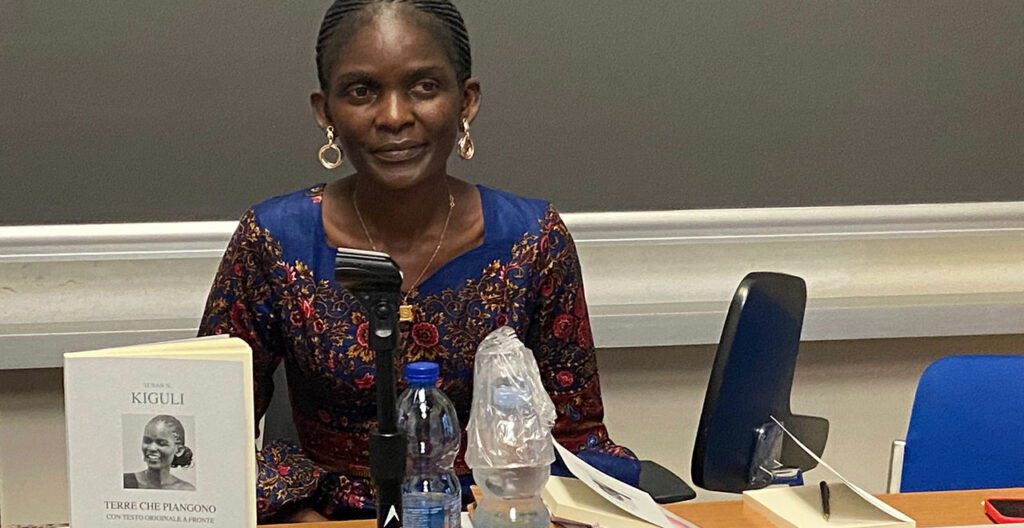From the bilingual Italian//English collection Terre che piangono, Interlinea, 2023.
WEEPING LANDS
The troubles in our lands
Swoop down like fish eagles
Talons open on the
Perplexed population.
I do not know
Who has invaded whom
Who seeks regional thrones
I do not know which general growls
Whose radio channel lies.
But I have seen
Rubble cover the defenseless
People blown to pieces
Fingers wagging
Leaders embracing
People dying.
I do not know which country
They defend
Whose children
They protect
Whose markets
They secure
Whose radio channel lies.
SELECTION FROM POEMS THAT HAVE APPEARED IN AFRO WOMEN POETRY PROJECT:
I LOVE HOME
For those people who find laughter
Such company
Laugh like they are falling apart
Or coming loose
With tears gliding down their cheeks
And these days all this on
A mobile phone.
For laughter that soars
Echoing in every nook
For laughter sprayed
On blossoming bushes
For laughter that escapes out of caves
Rising to greet the sun
For laughter of mobile phone to mobile phone.
For those people who had dance lessons
In the womb
Who touch the floor
Making it worship them
Who turn this way and create magic
Turn that way
And send a billion angels
Begging them never to stop
For them who whistle songs
And cast you into singing along
Despite yourself.
For those people who grieve
Calling upon a thousand names
Remembering name upon name
Revisiting each story of a life
Which matters to them
Each face of love.
For those people who feel their sorrow
From within to without
Who crawl and scratch the earth
As if she would answer their questions
For those who each day look upon the sky
And beseech God
Continuing to love
To hope
To live as if life is always
For those people who never let go of themselves
Of people who paint their landscape
For people who make sadness part of happiness
An element of peace
Of seeing before now and forever
For my people who make me
Long to understand what I do not understand.
MY MOTHER IN THREE PHOTOGRAPHS
Her face looks out
flawless
her sexuality electric
in a mini dress and sheer satin stockings
the girls of the 1960s
beautiful beyond belief.
She is looking through the camera
like her space is here and beyond
enchanting and enchanted
by the times when the dreams of freedom were young
the fortunes of Uganda
hot and sizzling.
My mother in the 1970s
More sombre but her skin
Still flawless
The abrasive years gentle on her youth.
Her body wrapped in a long nylon dress
stopping her ankles and
full sleeves touching her wrists
hooded sorrow in her posture
the flowing dress
is not because
she is a widow (which is by government action)
but it is a government decree.
Her magnificence and elegance
Seems to support the given name of the dress
*Amin nvaako.
My mother in the 1990s
neat short hair
luring in its intricate curls.
She wears a **busuuti
a sign of the times
a return home, a finding of
uncertain peace
a maturing of a woman and nation
an endorsement of a recognition of the troubles
she has weathered
a sitting down to count her losses and blessings
and a hand over of the future.
*Amin Nvaako means Amin let me be or Amin leave me alone
**Busuuti is a long and colorful traditional dress
MOTHERS SING A LULLABY
Mothers sing a lullaby
As the dark descends on trees
Shutting out shadows.
The sensuous voices swish and swirl
Around shrubs and overgrown grass
Hiding mountains of decapitated dead
And the glint of machetes
That slashed shrieking throats.
In these camps without happiness
Mothers maintain the melody of life
Capturing wistful wind
To sing strength into the souls of children
Who have never known
The taste of morning porridge
Or heard the chirrup of crickets in the evenings.
Mothers sing a lullaby
For the staring faces
Who cringe at the sound of footsteps
Whose playmates are grinning skeletons.
Mothers become a lullaby
Silencing the sirens of sorrow
Restoring compassion to the nation.

Susan Nalugwa Kiguli, born 1969, is a Ugandan academic and poet. She is an associate professor and was the head of the Department of Literature, at Makerere University (March 2012-July 2016). She earned a master’s degree abroad and a PhD in English from the University of Leeds (UK). Presidential Fellows of the African Studies Association (ASA) in 2011. She has devoted her research to oral and written African poetry, folk song and performance theory in post-apartheid South Africa and post-civil war Uganda. “From her work, it emerges that popular song and oral poetry are reflections of social, cultural and political issues that influence the societies in which they are produced». She was president of Femrite, an association of Ugandan women writers. Susan Kiguli is on the advisory board of the African Writers Trust (AWT). She has also served on the jury of the Commonwealth Writers’ Prize (African region) and has participated in various literature festivals, both as a writer and as a member of the jury, including the prestigious Nigeria Prize for Literature (2022).
Her first volume of poetry, The African saga (1998) placed her among the most important poets of eastern and southern Africa. The volume won the National Book Trust of Uganda Poetry Award (1999) and marked the history of literature in her country. Her works have appeared in various national and international magazines and anthologies. Her second collection, Home floats in a distance/ /Zuhause treibt in der ferne (Gedichte), is a bilingual edition, English and German (2012). In 2019 she participated in the Afro Women Poetry project founded by the journalist Antonella Sinopoli.





















































